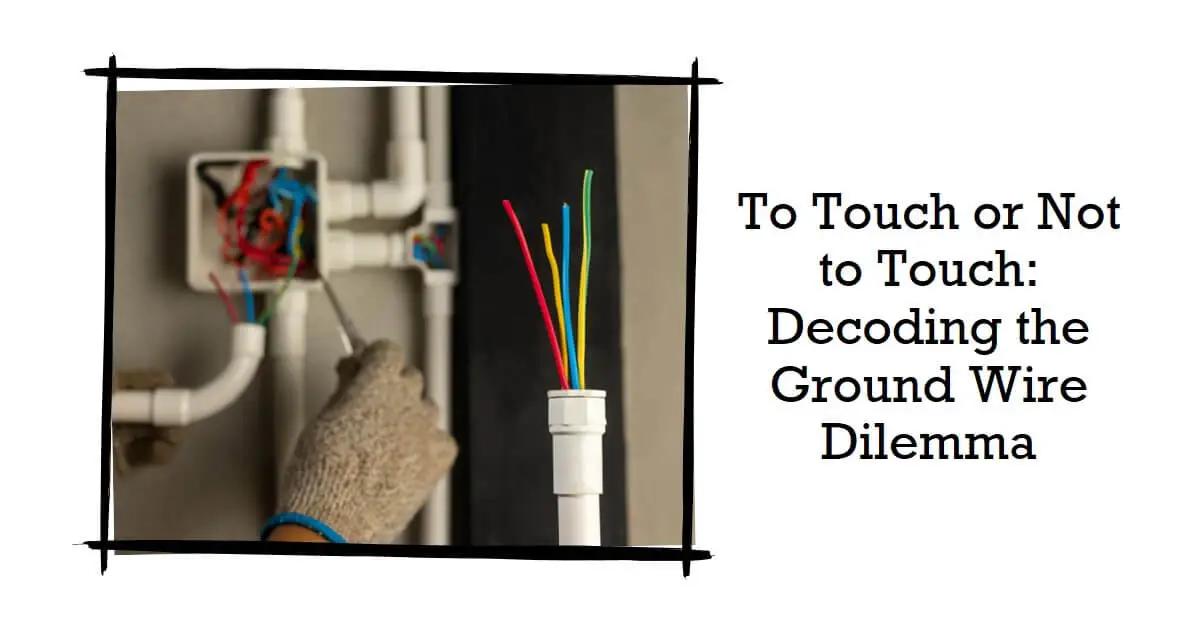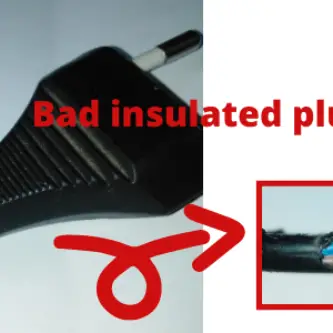Image: “Article Feature Image” by Bing is licensed under CC BY-NC-SA 4.0. Source: Bing Graphic Art. License: CC BY-NC-SA 4.0.
The ground wire is an essential component of electrical systems, serving a critical purpose in ensuring safety and preventing electrical hazards.
However, when it comes to touching the ground wire, it’s important to understand the potential risks involved and take appropriate precautions.
In this article, we will delve into the concept of the ground wire, explore the safety considerations associated with it, and provide guidance on whether or not it is safe to touch the ground wire in specific situations.
As a short answer, No, it is generally not safe to touch the ground wire unless you are a trained professional or have received proper guidance.
Understanding Ground Wire
What is a Ground Wire?
A ground wire is a conductive pathway that connects electrical devices, appliances, or systems to the Earth’s surface.
It is typically made of copper or aluminum and is designed to provide a low-resistance path for electrical current to flow in the event of a fault or electrical surge.
Purpose of Ground Wire
The primary purpose of the ground wire is to safeguard individuals and property from electrical hazards.
It helps prevent electric shock by redirecting stray electrical currents into the ground, ensuring that excess electrical energy is safely dissipated.
Components of Grounding System
A grounding system consists of various components, including the ground wire, ground rods, grounding electrodes, and grounding conductors.
These elements work together to create a safe electrical environment by effectively grounding electrical equipment and facilitating the flow of electrical faults away from sensitive areas.
Safety Considerations
Electrical Hazards
Electricity poses significant hazards if not handled properly. Electrical shocks, burns, and fires are among the potential dangers associated with electrical systems. Adequate grounding plays a vital role in minimizing these risks.
Importance of Grounding for Personal Safety
Grounding ensures that any fault or excess electrical current is directed away from people, reducing the risk of electric shock.
By establishing a low-resistance path to the ground, the ground wire helps prevent electrical energy from flowing through a person’s body.
Potential Dangers of Touching Ground Wire
While the ground wire is an essential safety feature, directly touching it can still be hazardous.
The ground wire is designed to carry electrical current during fault conditions, and coming into contact with it may result in electric shock, injury, or damage to electrical equipment.
Can I Touch the Ground Wire?
The ground wire is an essential safety feature in electrical systems, designed to redirect electrical currents to the Earth’s surface and prevent electric shocks or damage to equipment.
However, the ground wire can carry electrical current under certain circumstances, making it potentially dangerous to touch.
Even if the ground wire appears intact, faulty wiring or unexpected conditions can pose risks.
Therefore, it is recommended to leave any handling of the ground wire to qualified electricians who possess the necessary expertise and knowledge to ensure safety.
Adhering to this cautionary approach helps minimize the risk of electric shock, injury, or damage to electrical systems.
Ground Wire and Electrical Current
Since the ground wire is connected to the Earth’s surface, it can carry electrical current under certain conditions.
Therefore, it is generally advised not to touch the ground wire unless you are a trained professional or have received proper guidance.
Risks of Touching the Ground Wire
Touching the ground wire can expose you to the risk of electric shock or injury. Even if the ground wire is intact and functioning correctly, unforeseen circumstances or faulty wiring can lead to dangerous situations.
It is best to err on the side of caution and avoid touching the ground wire whenever possible.
Legal and Safety Guidelines
In most cases, it is not recommended for individuals without electrical expertise to touch the ground wire.
Laws and safety regulations vary depending on location, but it is generally advisable to leave electrical work and handling of the ground wire to qualified electricians who have the necessary training and knowledge to ensure safety.
Exceptions and Precautions
Grounding in Different Environments
Certain environments, such as construction sites or industrial settings, may have specific grounding requirements due to their unique electrical demands.
It is essential to follow industry guidelines and regulations when dealing with a grounding in these situations.
Professional Advice and Assistance
If you have concerns about the ground wire or need to perform electrical work involving grounding, it is highly recommended to seek professional assistance.
Qualified electricians possess the expertise to evaluate and handle grounding systems safely.
Precautions to Take if Touching Ground Wire is Necessary
In situations where it becomes necessary to touch the ground wire, it is crucial to take proper precautions.
Ensure that the power is turned off, use appropriate personal protective equipment (PPE), and follow safety procedures provided by professionals or industry standards.
Conclusion
Respecting electrical safety is of utmost importance, and understanding the risks associated with touching the ground wire is a crucial part of that.
While the ground wire serves a vital purpose in electrical systems, it is generally advised to avoid touching it unless you have the necessary knowledge and expertise.
By adhering to legal guidelines, seeking professional assistance when needed, and taking precautions, you can ensure your safety and minimize the risk of electrical hazards.
Always prioritize safety and consult experts in the field to make informed decisions regarding electrical systems and grounding.
you work With Electricity! Don’t leave empty-handed!
Looking to stay ahead of the game in the world of electrical engineering? Subscribe to my YouTube channel and gain access to exclusive content you won’t find anywhere else!
The staff I recommend (Amazon Affiliate Links to products I believe are high quality):
- Economy 120 Volt/60Hz AC Power Source – Step-Down Voltage & Frequency Converters 1800W
- UNI-T Digital Multimeter Tester UT139C
- 50-Amp Extension Cord for RV “100ft”
- Voltage Stabilizer 110/220v
- Hair Dryer “best selling“
- TOSHIBA EM131A5C-BS Countertop Microwave Ovens
Disclaimer: This contains affiliate links to Amazon products. I may earn a commission for purchases made through these links.



